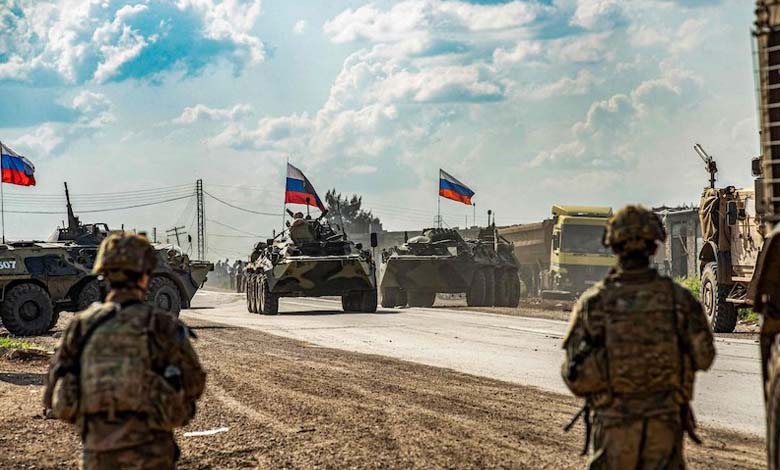The Black Ghosts Strike: Is Russia Returning to Guerrilla Warfare Through Syria?

In a scene evoking the shadows of the Caucasus wars and reshaping conflict maps in the Middle East, Russia’s Hmeimim Airbase in Syria was recently hit by an unprecedented attack. The assault was reportedly carried out by Russian-speaking militants, believed to be of Uzbek origin—a development observers call a “strategic shift” in the Syrian conflict.
-
Will Trump and Al-Sharaa Meet in Saudi Arabia? British Newspaper Reveals the Details
-
Gunmen launch attacks on Israeli army in southern Syria
The threat is no longer confined to local factions or splinter groups; it now takes on a transnational character, reviving painful memories from Chechnya and Dagestan, and raising existential alarm in Moscow. The attack, which killed three Russian soldiers, was not a mere security incident—it could be the prelude to a wave of ideologically and historically motivated retaliation against Russia’s presence in Syria.
Will Russia manage to contain this shadowy escalation? Or is Syria turning into a battleground where the Kremlin confronts “ghosts of the past” seeking vengeance for an unfinished war? These critical questions arise amid Syria’s fragile security landscape and in the midst of a still-unfolding political transition in the post-Assad era.
-
With Weapons and Soldiers, the Russian Bear Strengthens Its Influence in the African Sahel
-
Libyan Muslim Brotherhood Member Incites Armed Resistance Inspired by Syrian Factions
Unprecedented Escalation
In a dramatic escalation reflecting a shift in the nature of Syria’s security threats, three Russian soldiers were killed and others wounded in a bold attack by militants believed to be of Uzbek origin. The attackers infiltrated the vicinity of the Hmeimim base, throwing grenades and opening fire.
The Kremlin called it an “unprecedented escalation,” sparking wide debate over the assailants’ identities and ideological motivations. While attacks on Russian bases in Syria have remained relatively rare since Moscow’s 2015 intervention, this operation carried dangerous new implications, particularly as Russian-speaking attackers reportedly demanded that Russian troops surrender—a chilling echo of Chechen tactics in the 1990s.
-
Washington Navigates the Syrian “Minefield”
-
Who is General Marhaf Abu Kasra, the New Syrian Defense Minister?
Deep Concerns
Russian Foreign Minister Sergey Lavrov expressed “deep concern” over the growing frequency of extremist group attacks, warning that Moscow would “not tolerate any threat” to its forces abroad. He hinted at potential preemptive strikes on suspected foreign fighter strongholds within Syria.
The Bloody Legacy: From Chechnya to Syria
Foreign fighters from Uzbekistan and Chechnya who once battled the Russian army haven’t disappeared—they’ve merely shifted arenas, taking advantage of Syria’s chaos and decentralized power.
-
Observatory: Russia Transferred Syrian Officers to a Base in North Africa
-
Russia Accuses the U.S. and the U.K. of Recruiting Agents to Target Its Bases in Syria
These so-called “Black Ghosts,” as referred to by Russian media, fought alongside opposition forces for years. But after the fall of Bashar al-Assad’s regime in 2024, some have now redirected their weapons toward their old adversary: Russia.
Prior to the regime’s collapse, intelligence estimates placed the number of foreign fighters in Syria at around 12,000—half of them Chechen or Uzbek.
Whereas their past focus was toppling the Syrian regime, today’s power vacuum has revived “historic grievances,” now playing out on Syrian soil.
-
Secret Turkish Deals with Russia and Iran Accelerated al-Assad’s fall
-
Russia Reduces Military Presence in Syria Following al-Assad’s fall
Threat to Fragile Security
These developments are alarming not only to Russia but also to the new Syrian leadership, which is struggling to reassert authority over a fragmented state. The uncontrolled presence of foreign militants is a direct threat to national security, especially amid continued U.S. pressure to expel them.
Yet, the task remains complex, given Syria’s tangled security environment, the multiplicity of factional loyalties, and the state’s diminished control over national territory.
Moscow fears most that Syria could become “a new Chechnya”—this time, thousands of kilometers from its southern borders. The Kremlin worries the Hmeimim attack may mark the start of a series of revenge-driven operations that could extend deep into Russian territory.
-
Timeline of Events in Syria: How Did Damascus Fall into Rebel Hands?
-
Russia Accuses Ukraine of Arming Hayat Tahrir al-Sham
Possible Scenarios
Amid this volatile situation, three future scenarios emerge:
- An expanded Russian military response through precision airstrikes on areas suspected of harboring foreign extremists, especially in northwestern Syria;
- Enhanced security coordination with Damascus, involving special Russian units working alongside the Syrian army to track down foreign fighters;
- Opening international diplomatic channels, particularly with Turkey and the U.S., to monitor militant movements and dismantle their logistical support networks.












